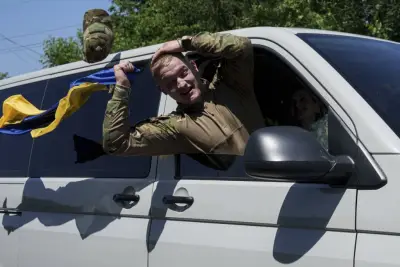Former POWs in Russia channel their pain into rebuilding lives in Ukraine

KYIV Ukraine AP Since his release from a Russian prison in April Stanislav Tarnavskyi has been in a hurry to build the life in Ukraine he dreamed about during three years of captivity The -year-old has proposed to his girlfriend bought an apartment and adopted a golden retriever And that was just what he accomplished one week in July But as busy as he is rekindling old relationships and creating new ones Tarnavskyi cannot shake the trauma he and thousands of other Ukrainian soldiers experienced as prisoners of war The U N says countless endured beatings starvation and humiliation at the hands of their captors experiences that will leave lifelong scars Tarnavskyi who was captured during the battle for Mariupol in April of regularly has nightmares about the prisons where he was held I see the officers who watched over us I dream they want to harm me catch me he reported When he wakes up his heart pounds anxiety surges until he realizes he is in the outskirts of Kyiv where he was forced to move because Russia occupied his hometown of Berdiansk As the three-year war drags on Tarnavskyi is one of more than former POWs back in Ukraine rehabilitating with the help of regular counseling Regardless of any physical injuries that may require attention psychologists say it is vital to monitor former POWs for years after their release the cost of war they say echoes for generations A marriage proposal In a photography studio high above Kyiv Ukraine s capital sunlight floods the white walls After a shoot that lasted several hours Tarnavskyi stated the brightness was hurting his eyes which are still sensitive from years spent in a dark cell But his mood couldn t be dimmed The girlfriend who waited for his return had just consented to his surprise proposal I love you very much I am very glad that you waited for me Tarnavskyi reported holding a thick bouquet of pink roses and a ring You have inevitably been my backing and I hope you will remain so for the rest of my life Will you marry me Tarnavskyi reported it was the thought of Tetiana Baieva whom he met in that helped stop him from committing suicide three times during captivity Still he finds it hard to talk with Baieva about his time in prison He doesn t want to be pitied Soon after he returned home he was paranoid feeling watched a reaction to constant surveillance in prison If you stepped out of line they d Russians come and beat you I still get flashbacks when I see surveillance cameras If I see one I get nervous he revealed But with each passing week he is feeling better progress Tarnavskyi credits to the work he is doing with a psychologist Lifelong care is vital Any small stimulus a smell a breeze a color can trigger traumatic memories for POWs says Kseniia Voznitsyna the director of Ukraine s Lisova Polyana mental vitality center for veterans on the outskirts of Kyiv Yet contrary to stereotypes ex-POWs aren t more aggressive They tend to isolate themselves avoid large gatherings and struggle with trust revealed Voznitsyna They say time heals five or ten years maybe but it doesn t she added It just feels less intense A examination in the Journal of Behavioral Medicine detected that Israeli ex-POWs and combat veterans tracked over years had higher mortality rates chronic illnesses and worse self-rated vitality conditions partly tied to depression and post-traumatic stress disorder The authors of the scrutiny mentioned that is why it is crucial to monitor ex-POWs and give them specialized therapeutic and psychological care as they age That logic rings true to Denys Zalizko a -year-old former POW who has been back in Ukraine for less than three months but is already sure his recovery will take a long time You can t fool yourself Even if you really want to you will never forget It will invariably haunt you he explained An artist to be Zalizko survived torture suicide attempts and relentless beatings during roughly months in Russian captivity The first time his mother Maria Zalizko saw him after his release she barely recognized him He was thin and appeared broken she revealed with torment in his eyes Zalizko s physical appearance is now almost entirely different His skin looks healthy his muscles are taut and he has lots of vigor But still there is sadness in his eyes Two things keep him moving forward and help clear his mind music and exercise Pauses and stillness bring anxiety says Zalizko Like Tarnavskyi he is receiving mandatory counseling at the Lisova Polyana mental physical condition center And like plenty of former POWs he still battles hypervigilance listening for threats scanning his surroundings At night sleep comes in fragments and that was true even before a new uptick in nightly drone attacks by the Russian army For the families of POWs the reintegration process is also a struggle A psychologist advised Maria Zalizko to give her son space to avoid calling him too often But it is Denys who often calls her sometimes trilling over the phone a skill she taught him as a child I love music Music unites he noted touching the tattoo of a treble clef behind his ear inked after his return Even in captivity he sang quietly to himself composing songs in his mind about love home and war Now he dreams of turning that passion into a career as an artist I ve become stronger now Zalizko reported I m not afraid of death not afraid of losing an arm or a leg not afraid of dying instantly I fear nothing anymore Source


